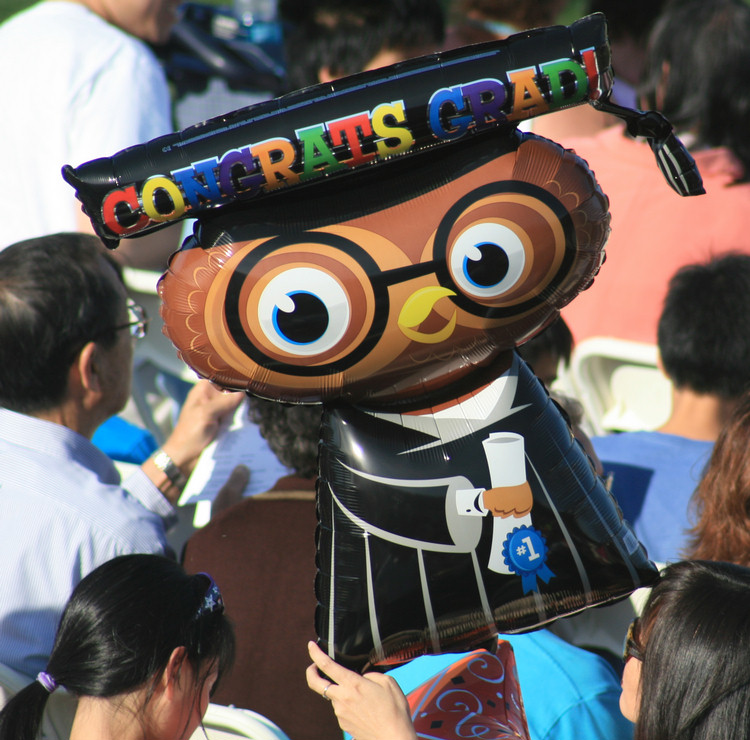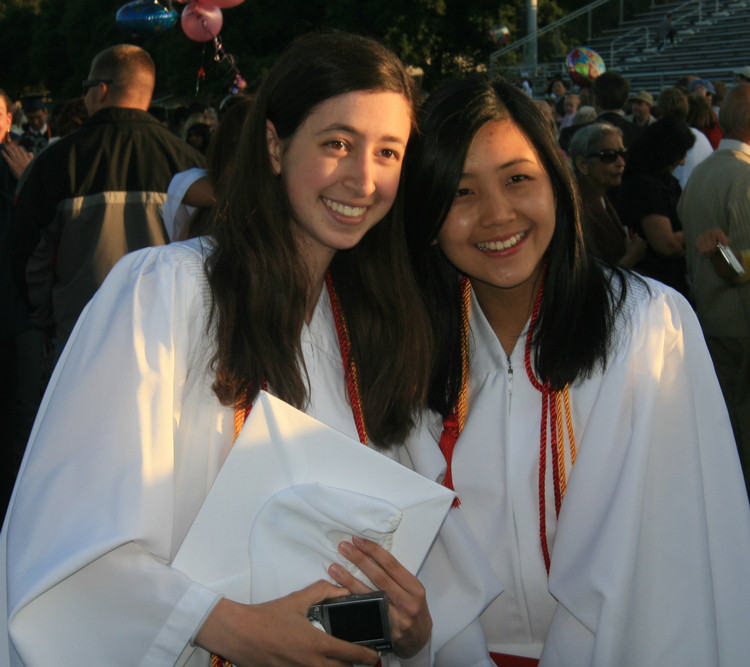Hannah Graduates High School
Hannah is on her way to UCI while Lisa enters High School, exciting times!
Did you know? - The academic cap or square, commonly known as the mortarboard, has come to be symbolic of academia. In some universities it can be worn by graduates and undergraduates alike. It is a flat square hat with a tassel suspended from a button in the top center of the board. Properly worn, the cap is parallel to the ground, though some people, especially women, wear it angled back.
The mortarboard may also be referred to as a trencher cap (or simply trencher). The tassel comprises a cluster of silk threads which are fixed together and fastened by a button at one end, and fixed at the centre of the headpiece. The loose strands are allowed to fall freely over the board edge. Often the strands are plaited together to form a cord with the end threads left untied.
Awaiting The Procession
Did you know? - A procession (via Middle English processioun, French procession, derived from Latin, processio, itself from procedere, to go forth, advance, proceed) is, in general, an organized body of people advancing in a formal or ceremonial manner

A beautiful day


"I've got to get a drink!"

The band begins to play

The wise old owl

The school leaders come forward
The Procession Is Two By Two And Then They Split Right And Left

Walking on astroturf with heels is not easy

Tippy toe tippy toe

Oops.... Where is the bobbie pins?
Did you know? - A bobby pin is a type of hairpin. In British English it is known as a "hair grip", but kirby grip is used as well. It is a small pin or clip, usually of metal or plastic, used in coiffure to hold hair in place. Typical bobby pins are plain and unobtrusively colored, but some are elaborately decorated or jeweled. A bobby pin is a double-pronged hair pin that slides into hair with the prongs open and then the flexible prongs close over the hair to hold it in place. Bobby pins became popular in the 1920s to hold the new bobbed hairstyles.


Screeching around the corner on two toes

"Hat straight, head straight? OK to go"

"I am here, let the party begin!"

"I know you guys are out there somewhere!"
Did you know? - The practice of wearing academic
regalia in what is now the United States dates to the Colonial Colleges
period, and was heavily influenced by European practices and styles.
Students of most colonial colleges were required to wear the "college
habit" at most times - a practice that lasted until the eve of the
American Civil War in many institutions of higher learning.
In some rare instances the practice has persisted, such as at Sewanee,
where members of one student society continue to wear the gown to class.
After the civil war, academic regalia was generally only worn at
ceremonies or when representing the institution.[30] There was not,
however, any standardization among the meanings behind the various
costumes. In 1893, an Intercollegiate Commission made up of
representatives from leading institutions was created, to establish an
acceptable system of academic dress.
The Commission met at Columbia College (now Columbia University) in 1895
and adopted a code of academic regalia, which prescribed the cut and
style and materials of the gowns, as well as determined the colors which
were to represent the different fields of learning. In 1932 the American
Council on Education (ACE) authorized the appointment of a committee "to
determine whether revision and completion of the academic code adopted
by the conference of the colleges and universities in 1895 is desirable
at this time, and, if so, to draft a revised code and present a plan for
submitting the code to the consideration of the institutional members of
the Council."
The committee reviewed the situation and approved a code for academic
costumes that has been in effect since that year. A Committee on
Academic Costumes and Ceremonies, appointed by the American Council on
Education in 1959, again reviewed the academic dress code and made
several changes. In the U.S., academic dress is now rarely worn outside
commencement ceremonies or other academic rituals such as encaenia.


Everybody is happy

Only a few more minutes

The Procession Stops And The Band Begins Other Songs

The seniors had to leave to join the choir for their last time

Band to the left; choir to the right
Speeches And Special Honors First

The Principal speaks

Caught reading the program!

The debate team did a marvelous job

"Ok Ok, I know it is soon now! Silly Principal, P comes right after A "
Hannah Is Called To The Platform

Gee, meeting the Principal and I am not in trouble!

The names are being read and Hannah is next

Only 2,000 people are watching you... Don't be nervous

The longest ten feet in my life

"OK, hand it over!"

It's mine!

"Quick, snap the pictures!:
Did you know? - The tassel worn on the mortarboard or a tam seems to provide, by tradition, the greatest opportunity for latitude in American academic dress. It has been black, or represented the university's colors, or the colors of the specific college, or the discipline. The tassel has also been used to indicate membership in national honor societies or other awards. However, strictly speaking, the ACE code states that "The tassel should be black or the color appropriate to the subject, " and only makes an exception for the gold tassel. Just as for the use of velvet headwear, the gold metallic tassel is reserved for those entitled to wear the doctoral gown. Only one tassel is worn at a time.

Back to my seat and then the party can begin

"They brought out the red carpet just for me?"
Did you know? - A red carpet is traditionally used to mark the route taken by heads of state on ceremonial and formal occasions, and has in recent decades been extended to use by VIPs and celebrities at formal event.
More generally "red carpet treatment" and "rolling out the red carpet",
refer to any special efforts made in the interests of hospitality.
The earliest known reference to walking a red carpet in literature is in
the play Agamemnon by Aeschylus, written in 458 BC. When the title
character returns from Troy, he is greeted by his vengeful wife
Clytemnestra who offers him a red path to walk upon:
"Now my beloved, step down from your chariot, and let not your foot, my
lord, touch the Earth. Servants, let there be spread before the house he
never expected to see, where Justice leads him in, a crimson path."
Agamemnon, knowing that only Gods walk on such luxury, responds with
trepidation:
"I am a mortal, a man; I cannot trample upon these tinted splendors
without fear thrown in my path."
Oriental carpets in Renaissance painting often show rugs and carpets,
patterned but with red often the main background color, laid on the
steps to a throne, or on a dias where rulers or sacred figures are
placed.
A red carpet was rolled out to a river to welcome the arrival of United
States president James Madison in 1821.

"This is steep!"

"A few more steps and they cannot grab me back!"



Back to her seat for a few more names

"I am on my way"


More congratulations





"I can do this"

"Ah... where is the beach ball??"

The final countdown begins

"... with the authority vested in my by the State of Confusion...."

Moving the tassels to the graduated side

Did you know? - The mortarboard is generally believed by
scholars to have developed from the biretta, a similar-looking hat worn
by Roman Catholic clergy. The biretta itself may have been a development
of the Roman pileus quadratus, a type of skullcap with superposed square
and tump and is now known as the Bishop Andrewes cap. The mortarboard
may also have been influenced by practices in Islamic madrassas. It was
originally reserved for holders of master degrees (the highest
qualification in mediæval academia), but was later adopted by bachelors
and undergraduates. In the sixteenth and seventeenth centuries
corner-cap (catercap in the Marprelate tracts) was the term used .
Traditionally they throw them in the air after the announcement of their
confirmation of their graduation.

She said she would wait on the field for us

Aunt Sue hugs the graduate

Proud Mom and Dad


Friends join in on the congratulations


Friends

